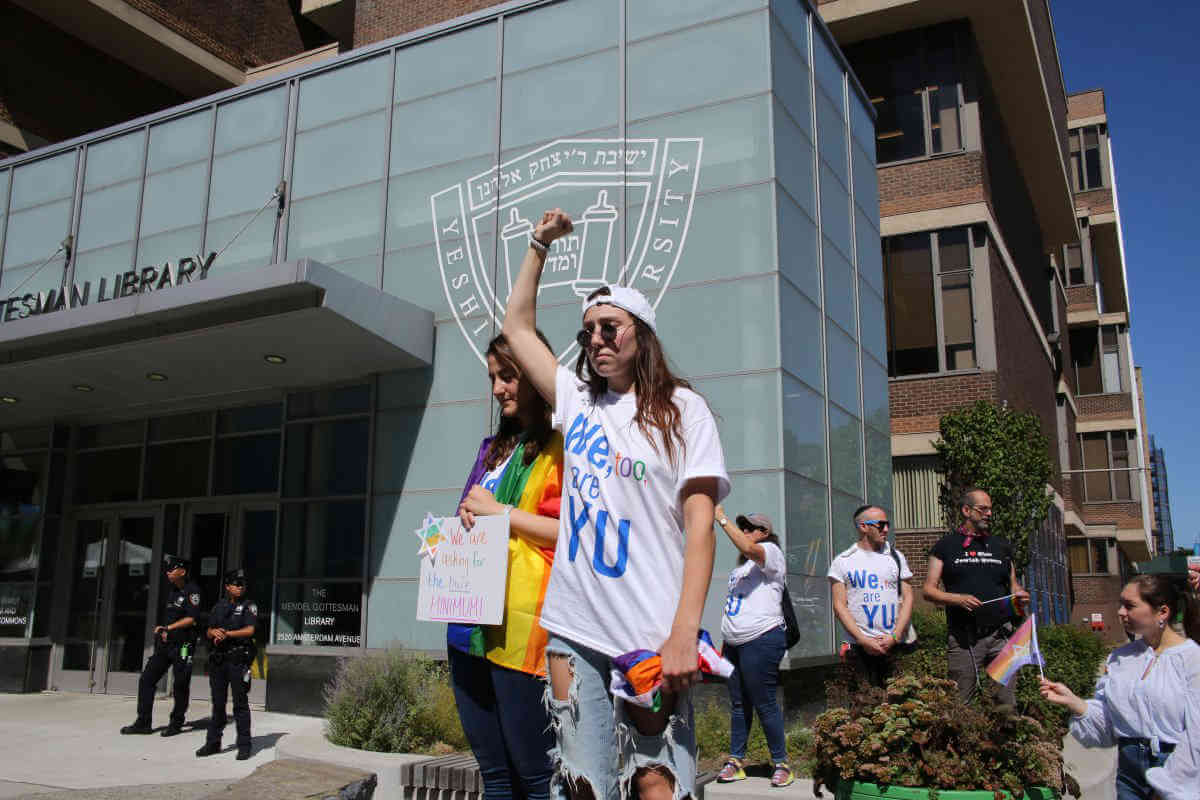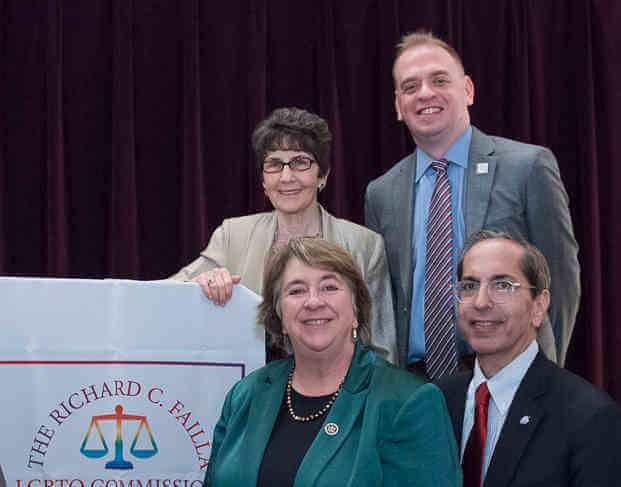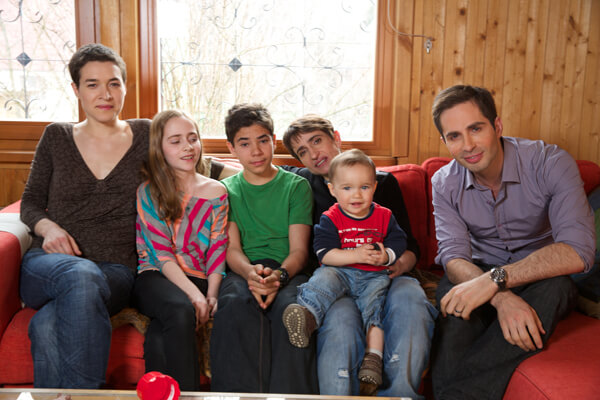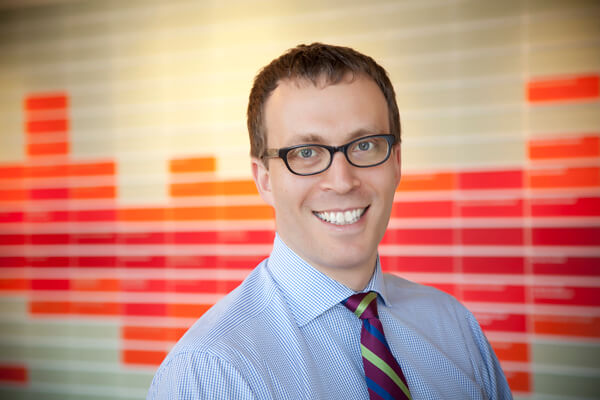The event along the edge of Bennett Park kicked off under a strong mid-day sun featuring a crowd that would eventually number somewhere in the range of 200. It was a rare sight in Washington Heights — a Pride Parade along West 181st Street — and culminated in something even rarer: LGBTQ rights T-shirts, Rainbow Flags emblazoned with Stars of David, and loud calls for equality on the Yeshiva University main campus. Yeshiva University, among the most important Orthodox Jewish educational institutions in the world, has a long, difficult history in recognizing its LGBTQ student population.
The September 15 We Too Are YU march and rally was organized by Molly Meisels, a senior at YU’s Stern College for Women and the YU Observer student paper editor-in-chief, along with biology major Courtney Marks, under the auspices of the YU Student Democratic Club. Meisels is president of the Democratic Club, and Marks, a junior, is vice president of LGBTQ and Women’s Rights for the club. YU currently has no Gay-Straight Alliance and its creation is among the students’ demands.
Prior to the march, Meisels said YU’s GSA would take the name YU Pride Alliance, and that “having this community, specifically for this issue, is how we get people to be less afraid.”
Meisels, raised Chasidic in Brooklyn’s Borough Park, explained, “I have tried using the Democrats as a springboard for LGBT events because we are not allowed to have a LGBT club.”
She added that queer folks on campus wouldn’t feel comfortable marching otherwise.
The students were denied a meeting with YU President Ari Berman, a situation Meisels called, “very disappointing, because if they are not willing to meet with us, we can’t plead our case, and nothing can occur.”
Meisels used the Sunday afternoon rally to come out as bisexual, her first time feeling comfortable enough to do so in a public forum. Marks also opened up about her coming out, saying she came out to her parents shortly before tending YU.

Telling attendees “some of our voices are forcibly muted to make room for the voices of rabbis and donors,” Meisels challenged the YU stance on LGBTQ issues, explaining, “YU has its own version of the universal declaration of human rights which are called the Five Tarot. They are five pillars which Judaism stands on.”
Meisels’ speech fit with similar sentiments of Rabbi Steven Greenberg, the author of the book “Wrestling with God & Men: Homosexuality in the Jewish Tradition” and founding director of Eshel, a group working to increase acceptance within the Orthodox Jewish community of its LGBTQ members.
“You can read the long version of these values on the YU website but in short, when Yeshiva fully embraces its own visionary ideals, our work will be done,” Greenberg, himself a YU alumnus, said.
He then proceeded to list out the Five Tarot and how they relate to embracing LGBTQ issues.
Guest speakers included Mordechai Levovitz, founder of Jewish Queer Youth; Rachael Fried, JQY’s current executive director; Dr. Joy Laden, a professor of English at Stern and the first openly transgender professor at an Orthodox Jewish institution; Justin Spiro, a New York City high school social worker coordinating with JQY on LGBTQ student initiatives; and Ely Winkler, who had tried to start a LGBT group at YU when he was a student a decade ago. Many speakers were themselves YU alumni.
In addition to a GSA, among the requests by student organizers and guest speakers were LGBTQ sensitivity discussions during student orientation and a dedicated liaison for LGBTQ initiatives.
There was no visible opposition to the event. There was support from surprising sources, according to Meisels, who said seeing traditional Orthodox Jews, “rabbis with long beards,” attending the rally, “reminded most of the people here of our families, and of the people we grew up with, and those are the individuals we want to see represented here. It is very personal to everyone here.”

Others lending support to the rally included Rabbi Sharon Kleinbaum of Manhattan’s Congregation Beit Simchat Torah, the country’s largest LGBTQ synagogue. Remarking on her own time as a student at the Orthodox Frisch Yeshiva High School in northern New Jersey, Kleinbaum said, “I am well aware of the struggles for LGBT people within the Orthodox world, and I am thrilled to see there’s now a generation of young people who are not accepting that if they want to be queer, they have to leave the religious world.”
Kleinbaum was accompanied by Rabbi Mike Moskowitz, an ally and CBST’s Scholar-in-Residence for Trans and Queer Jewish Studies.
It was not just students, alumni, and religious leaders at the rally, however, but parents as well. Among them included Joanna Klein, who said she was there to support her lesbian daughter.
“I am disappointed in YU’s reaction to what’s going on and I am hoping that they’re going to just open up their hearts and the Torah, and read where it says you have to be good to all your fellow man,” she said.
Originally, Meisels believed the march would not be allowed on campus grounds, and a barrier existed at Amsterdam Avenue in front of the pedestrianized 185th Street, which serves as YU’s main plaza.
However, with no visible opposition to the march, it became apparent protestors would be allowed in. Many began singing in English and Hebrew under the guidance of JQY’s Levovitz, who waved an enormous Rainbow Flag over the crowd.
Whether the power of the closet or the heat of the sun, the crowd at YU was significantly smaller than at Bennett Park. Still, reflecting on the day as the attendees disbanded, Meisels said the event “was better than I expected. It was people coming together. It was a scene of beauty to me.”

Gay City News reached out for commentary from YU about the event but did receive a response. As it had been warned ahead of hosting the event, the school’s Democratic Club lost its own official status days after the Pride Parade.




































